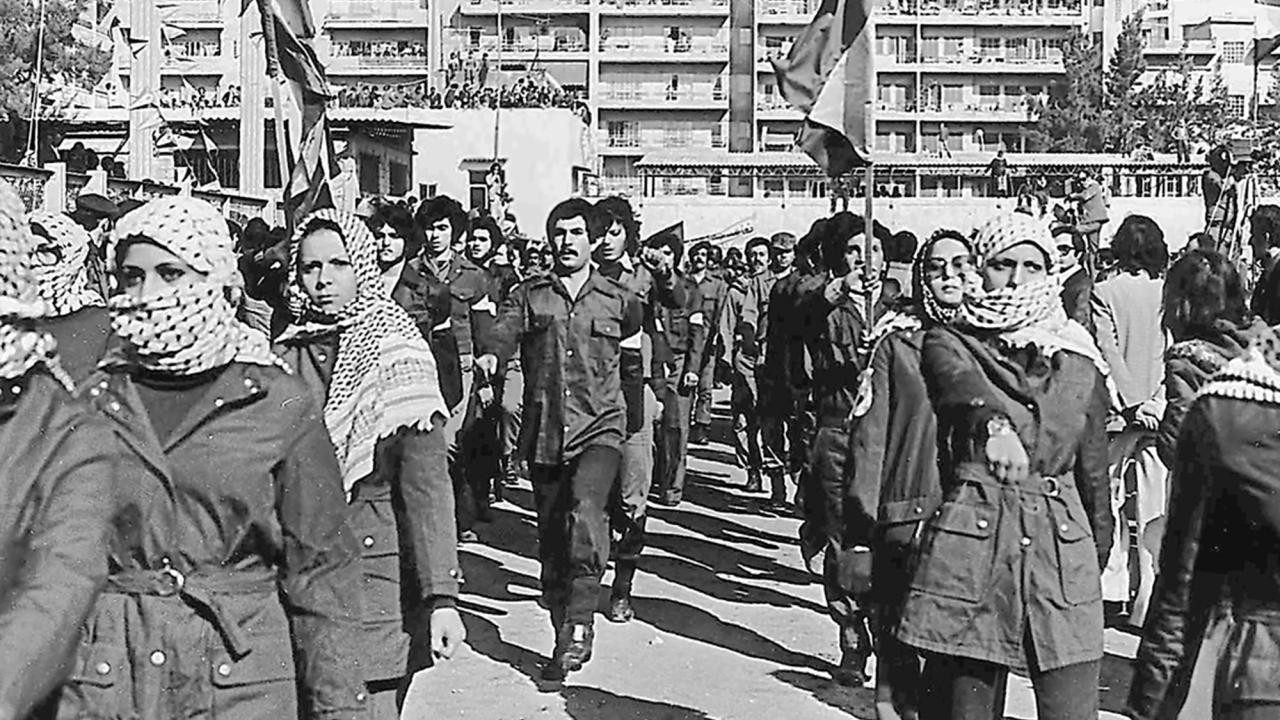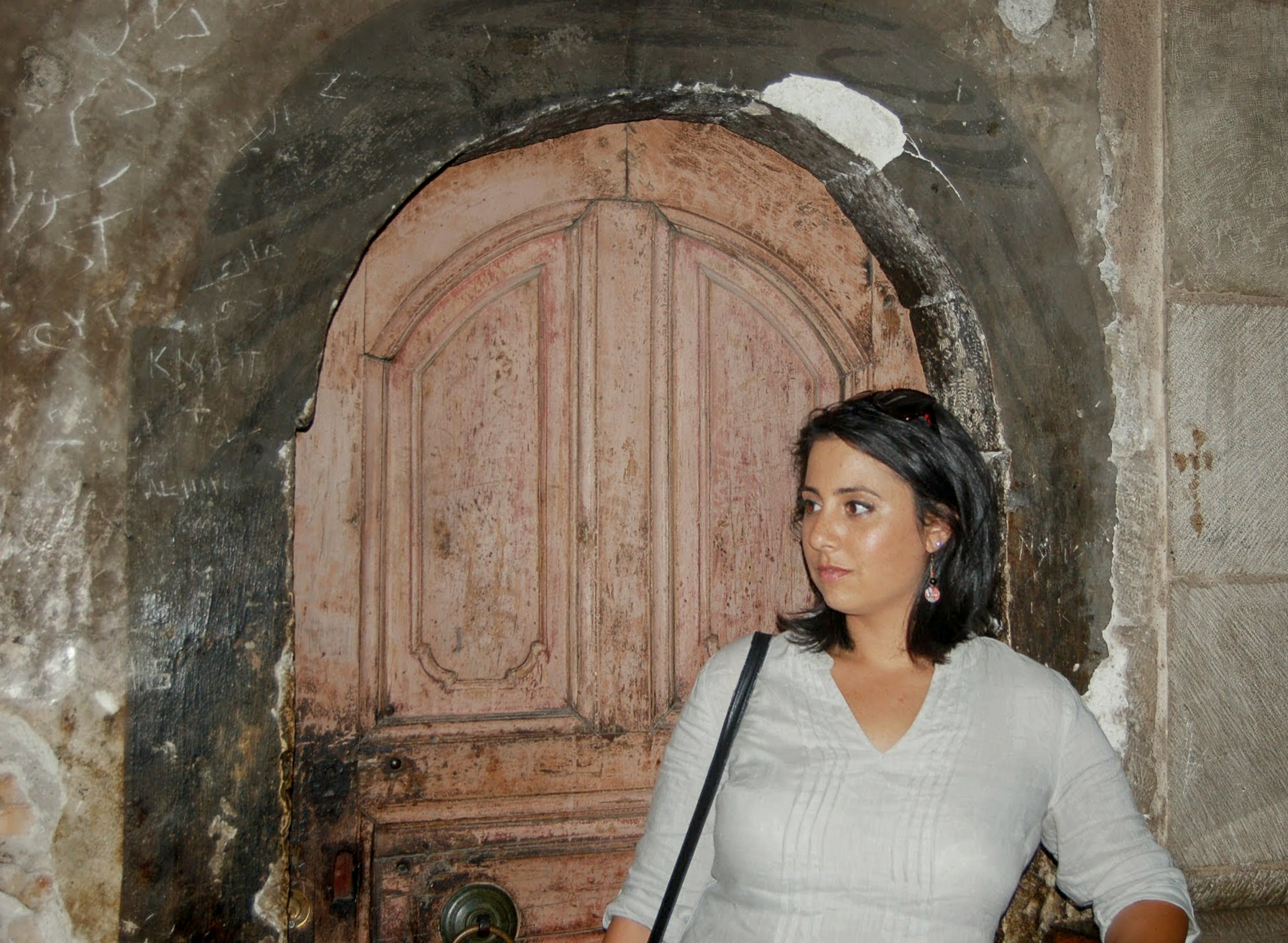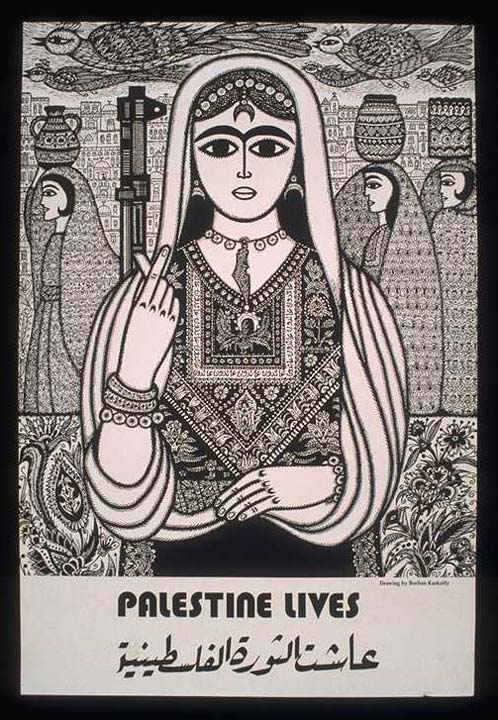
Feminist Futures Fellows: Jennifer Mogannam
We're proud to introduce you to the work of our 2019-2020 cohort, the Feminist Collaboratory Fellows. The year's research theme is Feminist Futures. We asked each fellow to participate in a video or written project to display their work and explore the theme further. This is the fifth installment in the series.
This interview took place on May 26, 2020.
Introduction
 My name is Jennifer Mogannam. I have a PhD in Ethnic studies and I'm currently a visiting scholar at the Feminist Research Institute at UC Davis. My research broadly fits into a couple of themes: Palestine studies and contemporary arab studies, particularly 20th and 21st century social movements, which also coincides with critical refugee studies, the Palestinian refugee question being a long-standing one, over 72 years now. In general, because of the transnational nature of my work, I explore themes around colonialism and empire, as well as capitalism or neoliberal policymaking worldwide. So that's the crux of my research. I also examine cross-movement work between Palestinian Arab movements and other struggles, both in the US and internationally.
My name is Jennifer Mogannam. I have a PhD in Ethnic studies and I'm currently a visiting scholar at the Feminist Research Institute at UC Davis. My research broadly fits into a couple of themes: Palestine studies and contemporary arab studies, particularly 20th and 21st century social movements, which also coincides with critical refugee studies, the Palestinian refugee question being a long-standing one, over 72 years now. In general, because of the transnational nature of my work, I explore themes around colonialism and empire, as well as capitalism or neoliberal policymaking worldwide. So that's the crux of my research. I also examine cross-movement work between Palestinian Arab movements and other struggles, both in the US and internationally.
The main research that I'm working to expand and redesign for my book project is on the Palestinian revolution and its time in Lebanon from 1970 to 1982. The revolution was officially based in Lebanon during this period. I look at the revolution’s relationship with the Lebanese opposition movement during Lebanese Civil War, which lasted from 1975 to 1990, a 15 year-long civil war. Specifically, I analyze the collaborative relationship between the Lebanese opposition and Palestinian revolution. This includes various sectors, modes of mobilizing, and the different targets or enemies that they're struggling against. My research pieces together how both Zionism, or the state of Israel, and US empire coalesce to create policies that feed and support the Lebanese status quo, which the opposition and the Palestinians are fighting against.
Methods

https://www.palestineposterproject.org/poster/cubs-of-the-revolution
I use oral history methods most heavily, but I also include archival texts as well as cultural texts. So looking at discourses coming out of that time, whether they are official documents or official posters. I look at posters of images that were being circulated at the time. Most heavily, I rely on the oral history major narratives, because I think we get such a rich discussion and much more in depth content than what meets the eye through those more official documents. That’s really where the fun part is, in piecing through that.
What planted the first seeds of your interest in this subject?
I have been an activist and organizer around Palestine and other social justice struggles for about 16 years now. I was always interested in the question of Palestine, and I really became interested during higher education in history because, through my activism, I realized that there is a lot of historical knowledge that doesn’t get encompassed in the recitation and knowledge of “dates” and the more common ways that we are molded to think about history. And this is true too regarding some of the more traditional or more common narratives around the question of Palestine.
I was interested in looking at history that was more uplifting. I think in the past two decades or so, a lot of the discourse around Palestine has been more victim-centered - proliferating how Palestinians are victims and trying to gain support through that narrative. Of course there are many injustices against Palestinians that may be productive for drawing parallels or sparking emotional chords for people on a question largely invisibilized (until recent years), however I was more interested in how we were empowered people and what that history is.
Then I did my master's degree in Lebanon, and so I had access to this big, rich canon of living people who participated in this period that doesn't always get registered as a significant part of Palestinian histories in the recent decades, this chunk between the 50s or 60s and the 80s that I feel is really under-discussed. That led me, in conjunction with a class specifically focused on oral history methods led by Rosemary Sayigh, one of the most well-known oral historians on Palestine, to explore this topic.
What does ‘feminist futures’ mean to you, and how do you see your work contributing to it?
Though unassuming, my approach centers imagining the future. Because I'm an organizer and an activist, I'm not just interested in history for the sake of writing history or out of general curiosity, but for me it's a way of studying intensely social movement histories in order for us to move into creating those futures. In all of the work that I've done, whether it's this main project or some of the side articles I've done or been working on, my focus really is, “How can we imagine that colonial future?” and I think feminism has to be a part of that question.

http://www.palestineposterproject.org/poster/the-palestinian-revolution-lives
Feminism, more broadly, less conventionally than maybe some popular understanding, is something that I work on in my main project. I actually just submitted an article that should come out by the end of 2020 on this question, specifically looking at how women were mobilizing in this moment, this Palestinian revolution moment, thinking about Palestinian statelessness in this era of the nation-state where it's taken for granted that everyone has states.
And then thinking about: What are some of the discourses and ideas that were being heavily circulated in this time, a time that's been discussed as the most liberating period for Palestinian women? How do we look at that experience? That sort of subjectivity, of being the most liberating period, ended. It didn’t continue. Why? I attempt to answer.
So when we're thinking about Palestinian revolution, how are we thinking about a more sustainable way of ending patriarchy, a more sustainable way of having that national goal or some sort of a liberatory process for Palestinians as a people, while at the same time, accounting for different social issues like dismantling patriarchy, like some of the questions of feminism that may have, at the time, been articulated as secondary, even by women and radical thinkers.
Drawing upon your background and expertise, what insights could you offer us in this time of COVID-19 pandemic?
I think that it's a really important time, whether academically or outside of the academy, to be organizing to fight for more justice and equity in the institutions that we work for. So, making sure that graduate students, contingent faculty, and non-tenured tenure track faculty are being taken care of. It's really scary to see that even tenure-track faculty at some universities have been fired as well as workers whose jobs might be more in jeopardy if there's no physical presence on campus: food workers, janitorial services, those kinds of things. And I think it's important that we're thinking about taking care of those folks through the university and thinking about it as an entire economy and ecosystem, especially in college towns like Davis or Berkeley. I'm here in the Bay Area. I grew up in Berkeley where most of the city is at a standstill now because the students are gone.
It's not just the question of invasion of privacy, but for me, for example, my work and my activism largely centers Palestine, and obviously we know that there's a lot of repression of that question on campuses by the administrations and government. They are passing legislation to prohibit BDS. What's that going to mean for me? I have publicly spoken out in support of that, as have many people. Making these kinds of technologies that give more access to different ways of collective evidence and persecuting certain peoples is something we also could be organizing around right now, making sure that we're staying safe and pushing away from the dictatorial authoritarian future that seems to be growing.
How does the pandemic influence how you approach your research?
It's making me nervous. I'm hoping to do more field work before I create a book proposal, a manuscript. I'd like to do more interviews and maybe some more archival work in the Arab countries, specifically Lebanon but also Jordan. I've kind of toyed with the idea of trying to do some Skype interviews, but I really don't want to. I mean, this is also a funding question too. The horizon for funding that kind of research, even if the travel is more open, seems really bleak (as if it weren’t already pre-pandemic), so right now I'm a little anxious as things are so up in the air. I'm still not 100% sure if I have anything lined up for next year.
And then what does that mean in terms of how long we should stay in academia? There's all these conversations, which I don't think are actually very productive conversations. But every time I see an academic article, it’s like, “You're not going to get a job. You just got screwed even more and the market was already bad. Quit now.” I'm like, well, let's figure this out. There are people with power on campuses. We shouldn't be disposable. We should figure out how to harness some power for more equitable and justice-centered educational practices.
I have done the adjuncting thing. It's really difficult. I mean, it's great to be in the classroom and I love the students, but I'm not a full-time lecturer or even any kind of stable part-time lecturer, so the adjuncting thing is really not sustainable without some sort of consistency every quarter/semester. We shouldn’t be expected to take a class one semester and then not be offered another class for another two semesters, but that’s a reality for many people including me.
These are questions that I have, more than answers.
I also think it is really important for people who are going online for teaching especially to be really careful about how we navigate that because we're using university purchased Zoom accounts. Everything we say and do on Zoom thus becomes university property that can be used to further adjunctify or make faculty more obsolete, to take your courses and run them without you and without paying you or to take your words and use them against you, an infringement on academic freedom, but also a great possibility. So I think we need to be really careful and really strategic about how we navigate that, and also be transparent with the students about that.
I hope that this is just an accelerated magnification of what was already coming in education, and I hope it backfires. I hope the takeaway is that going fully online is not sustainable or good for students and learning, whether higher education or K through 12, but I think we need to be also actively pushing against that.
What is at stake in your research?

https://www.palestineposterproject.org/poster/viva-la-union
The Palestinian people have been, you know, we're in a crisis. We've had a political vacuum for about the past 20 years. We haven't had any kind of cohesive movement guiding us toward a singular liberation project. And that's something that, both on the research end as well as on the community organizing end, i I've been working towards with colleagues and comrades, people that I work with on a transnational level, because that seems like the most viable option. By reviewing our own history and liberation, it can help us move forward in a new direction, but also carries that same vein.
We just on May 15 commemorated the 72nd year of the Nakba which means catastrophe in Arabic. It is what Palestinians refer to as the catastrophe, where over 750,000 to 800,000 Palestinians were expelled from Palestine, forced to flee and became refugees, and now we have millions of refugees worldwide, many of whom are still in refugee camps between Lebanon, Syria and Jordan, some who have become refugees a second time as a result of the Iraq War and the current state of affairs in Syria. They're two or three times displaced at this point.
It feels like an urgent task every day to be taking up these questions, trying to create a new reality through what is a really challenging era for us politically. Policy from the US has always been bad, but we see Trump's “deal of the century”, which is basically an order to take more land from Palestinians and relinquish more control, as well as claiming the capital of Israel as Jerusalem. There are all these little things, moving the embassy to Jerusalem, all these little policies that are actually making concrete changes on the ground.
So, I think Palestinian self-determination is at stake, not that I'm going to solve everything on my own, but it's a collective process and I'm part of that, and that's really what drives my work.
What was your experience like as an FRI Fellow?
My experience was great. I only wish that I had been able to make more connections on campus. Especially this spring. I took on a lecturing position at Davis and at one other school in the fall. Most of my time at Davis was focused on teaching and I met some really amazing students and faculty in Gender, Sexuality and Women's Studies, and also not from that field but taking my class there. It provided a platform for some networking for the symposium to hear what other people are doing and thinking. I wish I was able to take a bit more advantage of that. I'm hoping, if I do stay with the Institute for the upcoming school year, I will build more connections and engage more with people and other people's work, and have a more collaborative year in general this coming year.
Do you have any advice to offer on how to integrate activism and scholarship?
It depends on where you're at. On a practical level for graduate students, it depends on who you're working with and how open they are to this question. In my case, everyone knew I was organizing and for the most part we didn't talk about it that much and it was fine. I was also in an ethnic studies program, so in general, it's supposed to be more welcoming. And I think in my case I had general support, even if it was not verbalized or if others in the department didn’t share my investment in activism.
This is actually a really big question because my research has entailed both doing this more historical work but also having more contemporary articles that do reflect a little bit on my present day organizing and activist experience. This is always a tough thing to negotiate. How much of yourself, your people, your comrades, do you want to interject into your research, and for what purpose? Who is the audience? Do you want academics to have access to all of the things that you're thinking about or organizing around? What is at stake sharing stories of those in more vulnerable populations in the struggle for justice?
I try to ask myself some of those questions when I'm doing more ethnographic work, and also, to take care not to jeopardize the people that I'm working with and care about. But it's a hard balance. That's actually partially what drew me to doing more historical work: I don't want to expose what's happening right now. Let's work through that first.
But sometimes it's important. My motivation and the two articles that I have published already have been largely written for and inspired by non-academic audiences. Even though they're in academic forums and academics read them, they're predominantly for people organizing today. So that's how I hope to share and distribute more through the activist currents, and try to leverage my skills to serve as a tool for activism. That's my main framework for doing this. In addition to asking all those questions on a piece by piece basis, I think about how I can take what I have access to through the university and through academic knowledge, and use it for the benefit of the people that don't have that access. That's the driving framework.
Is there anything else you’d like to add?
I think we need to think about feminism in so many different ways. It's not a singular concept or question. This is especially true being Palestinian in the United States where Zionism has had a pervasive current in the women's movement. We need to think about how we're understanding feminism in relation to questions of justice, and settler colonialism is one of the greatest injustices in the history of humanity and conquest. That is a big question that we have to be thinking about when we're thinking about feminism, and we can't just take certain things for granted. We need to also be culturally aware.
How can people learn more about your work?
My website: https://www.jennifermogannam.com/
My Academia.edu page: https://ucsd.academia.edu/JenniferMogannam
Research Gate: https://www.researchgate.net/profile/Jennifer_Mogannam